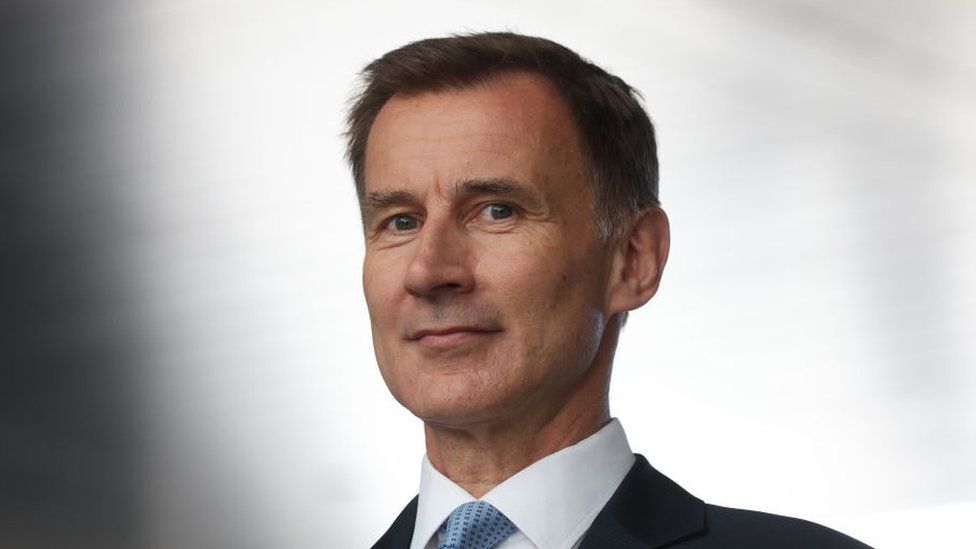Who is Jeremy Hunt? The chancellor in charge of nation's finances
- Published

As chancellor, Jeremy Hunt is the government's chief financial minister and is responsible for controlling how the nation's money is spent.
In his second Budget in the role on Wednesday, he will set out the government's spending plans in one of the last big economic events before the next general election.
It could be a critical juncture for the British economy, after a period of soaring living costs, anaemic growth and high tax levels.
Mr Hunt took over at a daunting time for the UK economy, after former Prime Minister Liz Truss's mini-budget caused turmoil.
Now he wants to put the economy on a path to higher economic growth and appease Tory MPs who have been calling for tax cuts.
After years of economic and political turbulence, it's a tall order for Mr Hunt, who is running out of time to get the UK's flatlining economy moving before the next election.
Jeremy Hunt: Education and family
Age: 55
Childhood: Grew up in Godalming, Surrey
Education: Oxford University, obtaining a First in philosophy, politics and economics
Family: Married to Lucia Hunt, three children
Parliamentary constituency: South West Surrey
The chancellor is a big name in the Conservative Party - and has twice unsuccessfully tried to become the party leader.
In the Tory leadership race last year, he put his weight behind Prime Minister Rishi Sunak over Ms Truss. This was after getting eliminated from the contest himself early on, having failed to get enough votes to go any further.
He had stood for the top job before - and in 2019 he nearly made it, finishing second in the leadership race with former Prime Minister Boris Johnson named as the winner.
Mr Hunt was brought up in the Surrey town of Godalming and attended Charterhouse School, where he became head boy and was known for his love of cross-country running.
At Oxford University, he served as president of the Conservative Association.
But prior to his career in politics, Mr Hunt had a career as an English teacher in Japan and as an entrepreneur - co-founding the Hotcourses education publisher. When the business was sold in 2017, he netted a reported £14m, making him one of the UK's richest politicians. Mr Hunt said he would use the money to fund campaigns after he leaves politics.
Mr Hunt was first elected to Parliament at the 2005 general election, taking over from Virginia Bottomley as the MP for South West Surrey.
From 2005 to 2007 he was the shadow minister for disabled people as a reward for supporting David Cameron - who attended Oxford University at the same time as him - in the Conservative leadership contest.
Then when the Conservative-Liberal Democrat coalition government was formed in 2010, Mr Hunt joined the cabinet as secretary of state for culture, Olympics, media and sport.
It was an important role in the run-up to the 2012 London Olympics, during which he worked closely with Mr Johnson, who was mayor of London at the time.
Earlier in 2012, he faced calls to resign over his role in the BSkyB takeover bid. The then-Labour leader Ed Miliband said Mr Hunt should quit over his contacts with Rupert Murdoch's media empire while he was considering the bid, which was later withdrawn.
But he survived the row and in September 2012, was appointed heath secretary.
He held office during a slow period of investment in the NHS which created big problems, amid times when demands on the health service were growing.
He also faced criticism over his handling of plans to introduce new contracts for junior doctors.
The medics took part in a series of walk outs in 2016 - on two occasions, between 08:00 and 17:00, leaving emergency care uncovered - the first time that had ever happened in the history of the NHS. A new contract for junior doctors was later imposed.
But Mr Hunt did go on to secure a funding increase for the NHS and also oversaw the introduction of an Ofsted-style system for rating hospitals and GP surgeries in England.
During the 2016 EU referendum, Mr Hunt was a remain campaigner, but afterwards said he would support leave.
His long-running appointment as health secretary ended when he became foreign secretary in July 2018. This was after his predecessor Mr Johnson quit over former Prime Minister Theresa May's Brexit strategy.
During his time as foreign secretary between 2018-19 Mr Hunt tried to free Nazanin Zaghari-Ratcliffe who had been held in Iran on spying charges, which she always denied.
After her release, he accused the UK of "diplomatic failure" and said global co-operation was needed to "stamp out" states taking people hostage.
Watch: 'I'm backing Rishi Sunak' - Jeremy Hunt
In March 2019, he became the first Western foreign minister to visit Yemen since conflict there began.
After losing to Mr Johnson in the 2019 leadership race, Mr Hunt said the campaign was "always going to be uphill" for him because he voted Remain in the 2016 EU referendum.
He was elected to head a committee of MPs which scrutinises the performance of the NHS and government health policy in January 2020, saying he was "honoured".
Last year, he revealed he had had cancer but had now recovered. He said at the time that "every member of his family" has had the disease and that he had "a minor one" himself.
Recently Mr Hunt made headlines appearing at an infected-blood inquiry where he called the scandal a "huge failing of democracy".
Related Topics
- Published7 March
- Published14 October 2022
- Published14 October 2022
- Published13 July 2022